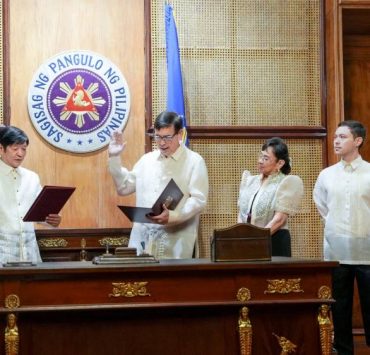Cha-cha foes slam TV ad: ‘Distasteful wordplay’
Opposition politicians and survivors of the martial rule of President Marcos’ father and namesake on Tuesday strongly denounced the television advertisement pushing for amendments to the 1987 Constitution for misleading Filipinos into believing that the Charter was obstructing the nation’s progress.They specifically reviled the TV ad’s use of the catchphrase, “Edsa-pwera”—a play on the Spanish term “echa fuera,” which means to throw out—to insinuate that the Constitution had cast aside ordinary Filipinos after the 1986 Edsa People Power Revolution that toppled the 14-year dictatorship of Ferdinand Marcos Sr.
“This is a continuation of the demonization of the Edsa People Power Revolution by the Marcoses,” said Albay Rep. Edcel Lagman, who has opposed repeated attempts to amend the Constitution.
“They wanted to convey that Edsa shoved away the people. On the contrary, the Edsa People Power Revolution was the people’s revolution,” he said.
‘Poisoning’ Edsa spirit
Former Sen. Leila de Lima, spokesperson for the Liberal Party, said the aim of those pushing for amendments to the Constitution was “to further poison the spirit of Edsa while pushing for Charter change.”
“Is the Constitution to blame for the problems of the country or the persistent corruption and greed for power?” she asked.
De Lima said that the Constitution was not the reason the country’s agriculture and education were slow to develop, reminding the public that these two sectors were the “focus” of the two highest officials of the government—the President on agriculture and the Vice President on education.
What should be prioritized are more robust infrastructure, honest leaders and trustworthy institutions, she said.
The advertisement, which ran for nearly a minute during primetime on Tuesday, shows Filipinos “frozen” in the classroom, in the market and in the office, a metaphor for how progress had stopped.
In one segment, a gate barrier comes down with the sign “Global investors not allowed,” alluding to the constitutional limits on foreign ownership of real property and certain industries.
Later, a narrator laments that foreign land ownership had been “Edsa-pwera.”
Finally, a group of people is shown holding up placards saying “Agricultural Reform,” “No To Business Monopolies,” “Better Schools, Better Education” and “Welcome Global Investors.”
Marcos ‘rehab’ in disguise
Kabataan Rep. Raoul Manuel described the ad as “prodictatorship and Marcos rehabilitation propaganda video packaged as advocacy.”
“Our problem was not caused by Edsa or one document. The economic crisis was already severe before the Edsa people power,” he said in a statement.
The Campaign against the Return of the Marcoses in Malacañang (Carmma) said the TV ad used “distasteful wordplay” to blame the country’s social ills on the 1987 Constitution.
Carmma coconvener Judy Taguiwalo said the amendments being advocated, such as allowing foreign ownership of land, were deliberately excluded from the 1987 Constitution “to remedy the Marcos dictatorship’s unhampered exposure of the Philippine economy to foreign plunder, to the detriment of local production, especially manufacturing.”
Foreign individuals and 100 percent foreign-owned corporations are not allowed to own private lands not only by the 1987 Constitution but also by the 1973 Marcos Constitution and the 1935 Commonwealth Constitution.
“By saying that progress came to a halt because of the 1987 Constitution, they are falsely claiming that Marcos Sr.’s martial law was a golden era of economic prosperity and that provisions in the 1987 Constitution that prohibit 100 percent foreign ownership of lands and businesses in the Philippines have been preventing economic progress,” she added.
One hallmark of the 1987 Constitution is the single six-year term for the president, to prevent a repeat of the extended rule of Marcos Sr. beyond what was to have been the end of his term in 1973.
“We are sure that these very same people will not stop at eliminating this economic provision, but will also push for the removal of term limits for government officials,” said Taguiwalo, a student activist in the 1970s who was incarcerated during martial law.
‘Creative way’
The TV ad was paid for by the law firm Gana Atienza Avisado on behalf of its client, the People’s Initiative for Reform, Modernization and Action (Pirma).
In an interview with the Inquirer on Wednesday, one of the firm’s senior partners, Alex Avisado, said that they were not trying to alienate the framers of the 1987 Constitution or tarnish the memory of the Edsa revolution by going with their “Edsa-pwera.”
“We put credit to the people behind Edsa and what Edsa stands for and we would never diminish the contributions of Edsa,” he said.
“That was just a creative way to attract the attention of the people [to provoke] public discussion … it is never our intention to discredit the framers of the Constitution,” he said.
Supporters
House Deputy Majority Leader Richard Gomez said a revision of the Constitution could “pave the way for reforms that encourage foreign investments, streamline bureaucratic processes, and foster a more business-friendly environment” to create more jobs, reduce poverty and bring overall economic development.
He acknowledged that some politicians were rejecting Charter change (Cha-cha) due to fears of a likely shortening or scrapping of their term limits, which he described as a “totally self-serving and selfish” reason.
Gomez, the Leyte fourth district congressman, denied that members of the House of Representatives were offered P20 million each to deliver signatures for a petition for Cha-cha via people’s initiative.
“Nobody has to pay or bribe me or any other lawmaker when it comes to pushing for constitutional reforms, which I believe will truly help our economy and improve the lives of our Filipino people,” he said.
Surigao del Norte Rep Robert Ace Barbers said that Congress should promptly act on calls by mayors and the League of Provinces of the Philippines to amend the Constitution.
He said that the statements of the mayors and governors should be “more than enough to jolt Congress into action and set in motion the wish of the people to effect changes in the Constitution.”
He pointed out that local chief executives were directly in touch with the people and know the realities at the grassroots.
“Their statements carry much weight and no other branch of government can question, deny or suppress that,” he said, citing their manifesto of support for Cha-cha via people’s initiative. —WITH A REPORT FROM REUTERS INQ

















